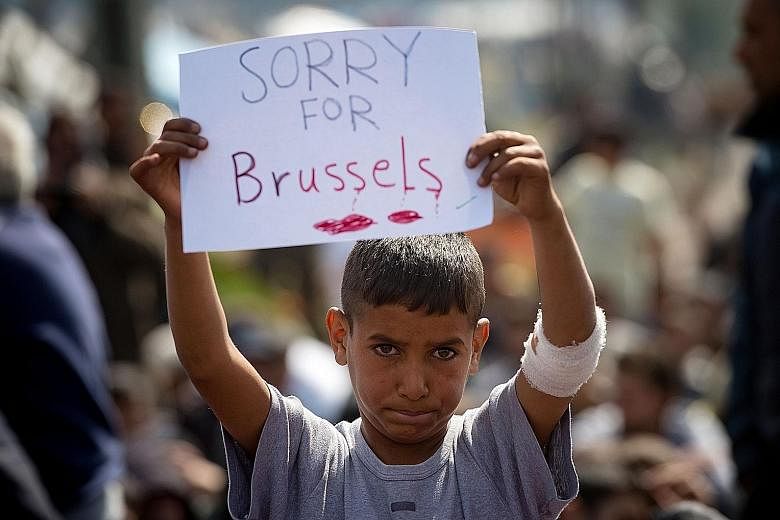LONDON • It did not take long. Almost as soon as the bombs went off in Brussels on Tuesday morning, the new act of terrorism in the heart of Europe was employed in the bitter debate about the influx of migrants from the Middle East and North Africa.
Even before the identities and nationalities of the attackers were known, there was an immediate association in popular discourse between the attacks on the airport and subway station in Brussels and the migrant crisis.
Right-wing politicians and average citizens alike raised concerns that groups like the Islamic State in Iraq and Syria (ISIS), which claimed responsibility for the attacks, are slipping radicalised recruits, including European militants, through the vast migrant stream and into an unprepared Europe.
The murderous attacks in another European capital - just days after the Belgians finally tracked down the sole surviving suspect in a series of similarly coordinated attacks that killed 130 people in and around Paris last November - prompted new questions about European solidarity and security. They came during a period of severe self-doubt about the European Union, with low growth, high unemployment and the threat of a British exit from the bloc, to be decided in a June referendum.
"There is a growing perception among European public opinion that EU leaders are not in control of the continent's terrorist threat," said Mr Mujtaba Rahman of the Eurasia Group, a political risk and consulting company. "Combined, these attacks will increase xenophobic and anti-immigration sentiment across the EU, which has already been rising in light of the EU's ongoing refugee crisis."
Right-wing parties all over Europe, and especially the Alternative for Germany party, "have and will continue to conflate refugees with terrorism", Mr Rahman added. "This will in turn put more pressure on incumbent governments and limit their space for policy action to address Europe's multiple crises."
Mr Nigel Farage, a leader of the populist, conservative UK Independence Party, said: "I think we've reached a point where we have to admit to ourselves, in Britain and France and much of the rest of Europe, that mass immigration and multicultural division has for now been a failure."
The attacks will also put more strain on the deal brokered last week by Chancellor Angela Merkel of Germany with the Turkish government to restrict the migrant flow into Europe, in return for more liberal visa arrangements for travel into Europe by Turkish nationals. That deal was already being criticised as a security threat to Europe and had been questioned on humanitarian and legal grounds.
"In the public eye, everything gets connected: the mass abuse in Cologne on New Year's Eve and the attacks today," said Mr Rem Korteweg, a security analyst at the Centre for European Reform in London, referring to the sexual abuse and robberies in Cologne on New Year's Eve that were linked to migrants.
"However different, in the public mind and for the eurosceptic populace, they're all the same thing."
The fierce reaction was evident on Tuesday in Germany, where Dr Merkel's popularity has been dented by her decision to open the country's borders to more than one million migrants last year, aiding the Alternative for Germany party in recent state elections. Officials in Dr Merkel's government who made the usual statements of support for victims were mocked and criticised on social media.
The fear of refugees and immigrants, which is tied to anxieties about globalisation and losses of both jobs and national identity, is not just a European issue. United States presidential hopeful Donald Trump has gained traction with his promise to build a wall between the US and Mexico, and his association of Muslims with terrorism and immigrants with crime.
But in Europe, the insecurity around migration and terrorism has challenged key beliefs and principles of the EU.
The Schengen area of visa-free travel across 26 countries has already broken down under the pressure of the migrant flow, with many worried that the zone may never be fully resurrected because of terrorism.
NEW YORK TIMES

